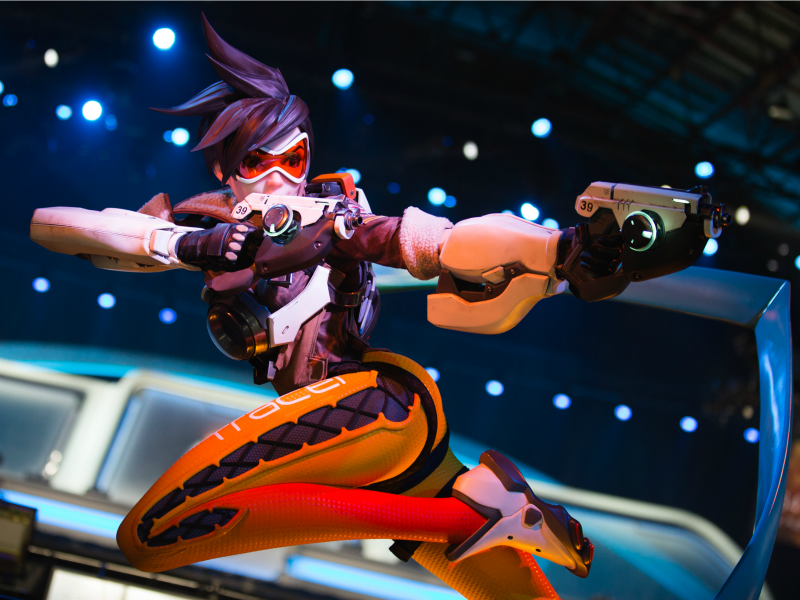Taylor 08 Jan 2018 // 7:09AM GMT

As an avid fan of video gaming and a counselor to some of the most innovative brands in the space, I can confidently say that 2017 was a banner year for esports. Just look at all of the breakthrough accomplishments last year (list after video). But first, it's worth taking a moment to watch this video that highlights the celebrities who have made investments in esports:
Esport accomplishments in 2017:
- Overwatch League signed 12 teams for the first-ever global city-based esports league, featuring investments made by some of the most successful owners in the world of sports: Robert Kraft (New England Patriots, New England Revolution), Jeff Wilpon (New York Mets), Stan Kroenke (Los Angeles Rams, Denver Nuggets, Colorado Avalanche, Colorado Rapids, Arsenal FC), Andy Miller (Sacramento Kings) and other noteworthy names from both traditional sports and esports
- Riot introduced a franchising model for teams powered by investments from mostly NBA team owners and the endemic gaming space
- Intel Extreme Masters held its premiere tournament in Katowice, Poland with on-site attendance of 173,000 fans, making it the biggest live event in esports history
- Blizzard opened a dedicated esports stadium called Blizzard Arena at the former studio of The Tonight Show with Johnny Carson
- The League of Legends World Championship reached 60 million unique viewers online, compared to 43 million in 2016
So where does the sport evolve from here and what does it mean for current and prospective sponsors and their partners? Our experience and alliance working with client partners Comcast and Activision Blizzard (and its Overwatch League) tell us the marketing opportunities within esports will only continue to accelerate and diversify. Here are four overarching trends we’ve identified for the next 12 months within this dynamic industry:
- Mainstream consumer awareness of esports will grow faster than predicted
With increased investments from celebrities, teams, and non-endemic brands, it’s not a surprise that esports is growing at an unprecedented rate. Nielsen reported in 2016 that 14% of Americans aged 13 and older are avid fans of esports. And according to industry research group Newzoo, 1.3 billion people worldwide are aware of esports. That leaves more than six billion people around the world who are not aware of esports. Talk about opportunity!
The reason behind esports’ record growth and global awareness is because the industry continues to blend in seamlessly with traditional sports and our cultural fabric. As an example of esports and traditional sports culture colliding, Overwatch League aired an ad on ESPN during the 2017 ESPYs awards show (you can watch it here). In case you didn’t watch it live – you’ll see more esports awareness plays like that plugged into bigger cultural moments (football Sundays maybe? Super Bowl even?) where you won’t be able to miss it.
- Blue chip, non-endemic brands will continue investing in esports through sponsorships
This trend isn’t new to 2018 since it’s technically already happening. Companies like BMW, Mercedes-Benz, Jack in the Box, Intel, Snickers, Coca-Cola and others are diving into the space, innovating across an industry that has already generated $1.5 billion in 2017 alone. At this rate, esports is projected to bring in $2.3 billion by 2022, according to statistics company SuperData.
What we will see in 2018 is the accelerated pace of new brands entering the space and the sophistication and reach of these partnerships. No longer is the market so fragmented that brands can’t get a good read on their ROI. Stability and projected longevity from entities like Overwatch League and Riot’s League Championship Series will offer brands more visible, global, robust platforms from which to activate and leverage their sponsorships.
- More celebrities, pro athletes, and team owners will be involved in professional esports
The massive growth of esports has not only caught the eyes of brands and team owners. The dizzying pace at which celebrities and pro athletes are investing in esports teams, leagues, tech companies, etc. will be an intriguing sidelight to the growing allure of esports. Just to rattle off a few names who entered the space in 2017:
- Marshawn Lynch
- Jennifer Lopez
- Joe Montana
- Shaquille O’Neal
- Robert Kraft
These investments are just another indication of the benefits esports has to offer. Smart investors who jump in early will ultimately reap the rewards of brand integration and awareness and increased revenue stream. This year, when the Kraft Group bought into the Overwatch League, Robert Kraft, chairman, and CEO of the Kraft Group, said this decision was made after careful and extensive research in the industry.
“We have been exploring the esports market for a number of years and have been waiting for the right opportunity to enter," said Kraft. "The incredible global success of Overwatch since its launch, coupled with the League's meticulous focus on a structure and strategy that clearly represents the future of esports made this the obvious entry point for the Kraft Group."
4. Broadcast/streaming convergence as big media players battle for valuable media rights.
Are we moving to a premium viewing model in esports like some experts predict? The answer is not entirely – at least for now. But what will happen is more deals being made with significant streaming partners like Facebook, Twitter, YouTube and, of course, Twitch. And when you look at the younger audience demographics, it’s easy to understand why esports has found a home on these platforms. In addition to online media, mainstream television networks will also jump in to grab a piece of this lucrative pie. In 2016, Turner made a bold move by investing in esports. This year, ESL announced a partnership with former Fox Sports chief David Hill to launch "eSports by Hill" which will provide premium broadcast experiences to esports.
The esports industry is growing at an exponential rate year-over-year. Media rights, advertising, merchandise sales, sponsorship opportunities and revenue streams are all increasing by double digits each year -- and we see no end in sight. Taking the aforementioned four trends into account, marketers should not view esports as building toward a bubble.
With hundreds of millions of streaming hours viewed and revenue generated in this space, we can’t point to a reason why NOT to invest in an area with such a significant potential for marketers.



































.jpg)


84507c4a918367d3ac1bff0000c9ebb1.png)

.jpg)











